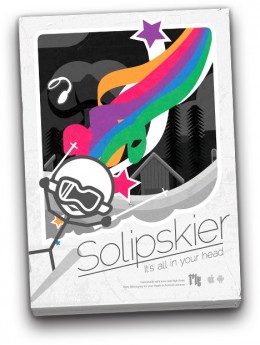
When a game developer creates an awesome game, we expect its next release to be just as good. This works both ways. Greg Wohlwend and Michael Boxleiter of Mikengreg fame have told me what it feels like to have to work on something new with the expectation of past success in the background. It isn’t just noise — it’s having an effect on the development on its new title, Gasketball. From ideas to coding, the shadow of the success of an arcade skiing game called Solipskier [$.99] looms. It makes decisions harder. It ramps up the scope and quality. It’s making the stakes higher at a time when the studio is looking to do something totally different.
We discussed two kinds of pressure: external and internal. Mike and Greg said that they don’t feel any external heat as they build Gasketball. Solipskier got into a lot of hands, but that hasn’t given the studio the kind ravenous base that other great independent developers, like Team Meat of Super Meat Boy fame, enjoy. There aren’t throngs of people expecting mastery in the follow-up from Mikengreg, in other words, so the bar feels low.
The pressure comes from inside, they expressed. Solipskier’s sales were the best Mikengreg has ever experienced, and the studio desperately wants Gasketball to outperform it in revenue, quality, and audience. Success is mutating their goals, as if the magic of Solipskier could ever be repeated.
“We really want our next game to seem like a step up, which is not actually very different from our early development days, every game we’ve made has been more interesting, more polished and more successful than the last," Mike told us in an e-mail exchange. “The difference, now, is that we are trying to succeed in terms of a million players willing to pay us, which sets the quality bar dauntingly high for a two-man outfit."
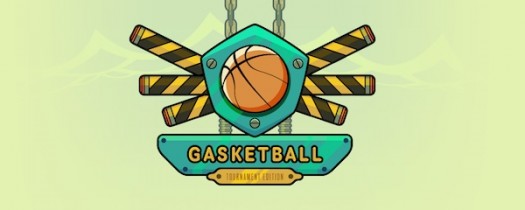
Greg keeps asking himself if it’s even possible to have another Solipskier, and that seems like a fair question to ask. Its development, from idea to prototyping to final release, happened in brilliant flashes of creativity. Gasketball, on the other hand, hasn’t had that sort of conceptual magic. The conceit took longer to come along, and the studio had to throw out a lot of stuff in order to find this game.
“We had to resolve to getting down in the muck and doing the hard work of prototyping, testing, and scrapping everything for yet another prototype that felt like it had promise," Greg told us. “For a game to really strike all the chords for us it has to be pretty specific." Solipkier was initially designed as a Flash game. A lot of its systems and mechanics are designed around that platform. Gasketball is a departure, so it took longer to design as the studio learned new tricks.
The idea for Solipskier came from a brainstorming session that revolved around parallax scrolling. Speed and parallax seemed to gel well, so Mike and Greg started prototyping. In a blog post, the duo described the idea for the landscape painting component came as a watershed, “oh my god” moment. With wide-eyes, they went to work. In the end, the Mikengreg created an exhilarating skiing game unlike any other. Instead of focusing on tricks, jumps, and speed, Solipskier leverages style and the emotion that bursts from your chest when you feel like your acceleration is spiraling out of control.
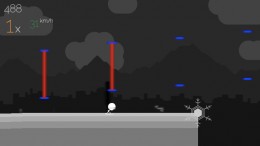
This wasn’t the duo’s first rodeo. Solipskier was created first and foremost as a flash game, just like Mike’s other titles as a part of Intuition Games. It was, however, the first game of either developer to grab major mainstream appeal. Mike tells me that he realized that this was a truly special project after publishers had entered into a bidding war for the game. An iOS version wasn’t in the picture at the time, but the reality of Flash development changed the tone of the porting conversation going forward.
“We were always looking for the next step out of the Flash world and into a more sustainable market that allowed for us to make larger, more fully formed games," Greg told us. “The Flash market is great and gave us a way to become better developers while getting paid for it; however, it wasn’t a sustainable business."
Mike and Greg were working “crazy hours," and fretting over paychecks when they developed for Flash. Living by the seats of their pants did have its moments. “It was exciting in some ways for sure, but it couldn’t last," Greg said. “We were lucky to have such success with Solipskier, as it’s allowing us to fully commit to iOS and downloadable titles in future."
Within the first two months, the iOS version of Solipskier made a little over $70,000, while the sponsored Flash version generated $15,000. On Metacritic, it’s sitting at a 79 average across five positive reviews. Greg tells us that this success “changed the scope" of what it could do with its next game. The duo continued to pay themselves the same amount of money, but Solipskier gave them consistency and the ability to screw up.

“Since Solipskier, we’ve made six or so fairly polished prototypes and scrapped all of them," Greg tells us. “We could have taken any one of those further but we’d rather call it a failure early and often than find ourselves with a less than stellar finished game that never found that magic we always look for."
Solipskier’s success and design are weighing heavily on Mike’s mind as he executes concepts on Gasketball. He second guesses a lot and he’s finding it hard to accept praise from friends. “We’ve always seen the flaws in our work first and foremost, but even worse on this project I see things that aren’t there." Mike elaborated: “My brain is constantly convinced that there are more features I need to discover before the game will be good, but they’re always just out of reach or vision. Every time I implement an idea and it doesn’t make the game instantly better I feel a crush of defeat. I feel a bit like I’m going crazy."
They’re not alone in this, though.
The Other Guys
Other studios go through the similar issues. Some deliver greatness quickly. After Chair Entertainment released a brilliant Metroid-style game called Shadow Complex on XBLA, it was able to stoke a similar sort of fanfare and praise with the launch of Infinity Blade. After Simogo released Bumpy Road, it followed it up with an equally charming rhythm and stealth game called Beat Sneak Bandit.
Some studios deliver late. Mobigame released its puzzle game Edge a couple of years ago to insane levels of acclaim and drama. The app was pulled because of a bogus trademark violation just as it was hitting critical mass, and the studio had to fight for the game to get back onto the App Store. Its follow-up, Cross Fingers, released 11 months after Edge. Mobigame’s David Papazian tells us that Cross Fingers is picking up steam. Edge has since been re-released.
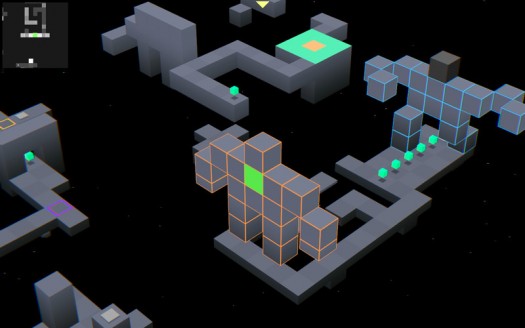
“We were very happy with this second game because it is really innovative and completely unique on the App Store. While I am writing, I can see that Cross Fingers is 5th in the Top Free in the US App Store with more than 8 million downloads. However, the game works a lot better now than it did at the start, because we evolved with the market. We added more levels and in-app purchases. Also, the fans are not the same as Edge fans, a lot of women and men from any ages love Cross Fingers, when Edge is more for gamers.”
Papazian says Edge, and its awards, gave his studio legs. The popularity led him to meeting a lot of people, and gave him a good “in" when introducing his work to press. His studio’s pressure was internal, too.
“But you have some pressure, you must do it again and you polish the new game as much as you can, maybe too much. Luckily we did it again, but we did not receive any awards and Apple never featured Cross Fingers on the US store. We had to fight for this success, by updating the game until it finally worked."
Tiger Styles grabbed a lot of attention with its puzzle game Spider: The Secret of Bryce Manor. While working on the follow-up, a Metroid-style game called Waking Mars, Tiger Styles’ David Kalina said he felt a subconscious kind of pressure to one-up Spider. It’s a similar feeling that Mike and Greg feel as they create Gasketball. “When you make a game that gets game of the year nods,” Kalina told us, “there is definitely this feeling that EVERY game needs to live up to that standard, which is sort of an impossible bar to try and meet every time out.”
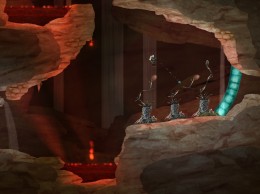
The development of Spider had a sense of urgency to it. He needed the game to succeed so his studio could exist. With Waking Mars, Kalina said that urgency was replaced with the desire to blow everything up in its second game, which again, is something Mikengreg is similarly struggling with. “When you start approaching game development that way, the cost of everything goes up, and the more you spend, the more risky it is to fail," he admitted.
Waking Mars, in the end, will keep his studio alive. However, Kalina said he wouldn’t pour so much time and so many resources into Tiger Style’s next game. Kalina wants to be able to fail and experiment and do bold things.
“I’d like to release two or three games in the next year and have them all be surprising in some way, and if they don’t happen to set the world on fire, we can be cool with that because we’re at least trying to push in new directions,” Kalina told us. “The worst thing we could do now is to say ‘we have to do something just like Spider or Waking Mars BUT BIGGER…’ If we go down that path, you may never hear from us again!”
On Gasketball
Gasketball has a chance to be stellar. It’s a basketball game that has its users matching their opponents’ last shots. It’s like a digital version of HORSE, except rendered on a fantastical 2D plane that lets you freely move the hoop and shot placement around. It also has special balls and barriers that you can set up to make your shot more Byzantine and advanced. There’s a plan in place to continually update the game as it lives on the App Store.
Surprisingly, nothing mechanically in Solipskier informed Gasketball’s creative direction, Mike and Greg said. In fact, Greg argued that there wasn’t one to begin with. He said Mike came up with the idea for a playful and fun basketball game that was “a bit more skill-based than just a slingshot or pre-mapped trajectory control scheme" game. Moving in a new direction entirely, Gasketball eschews the stark contrasts of Solipskier in favor of a more playful and fun art direction.
Mike walking people through their first look at Gasketball.
Our expectations got the best of us when we first saw Gasketball. It’s just not the game you envision this studio doing at first glance. Solipkier was speedy and sharp, and it had a very specific and awesome rhythm, tone, and style. You’d figure the next game from this studio would incorporate some of these elements. This game is exceedingly friendlier in look and behavior. It also looks like it’ll require more thought, though it feels a shade or two less impressive from a conceptual standpoint.
The stakes are just higher now. But there’s also another reason this project is especially different for the studio. Like with Mobigames and Cross Fingers, Mikengreg see Gasketball as an opportunity to grab an entirely new audience.
“We’re both getting older and want to do more with our lives than spend a hundred hours a week in a dark office,” Mike tells us. “When you start working independently you tend to hold your breath and accept sacrifices to your happiness in the short term for long term gains and we’ve yet to really succeed in a way that really gives us the security to let go and look to the future. It can get very nerve wracking to think that you only have one shot at releasing each game, and every time you fail to reach your goals you get one step closer to having to quit trying."
It’s a strange world right now for Mikengreg, as the studio struggles with the success of Solipskier and thinks about a studio-wide transition. But it’s confident about Gasketball and its eventual quality. We are are, too. We’ve seen the game in action, watched the videos, and have even fiddled with a build. The title threw us off at first, sure, but now that we’re comfortable with the fact that Mikengreg are switching focus, we’ve been able to move past those expectations. It’s figuring out how to do that, as well.